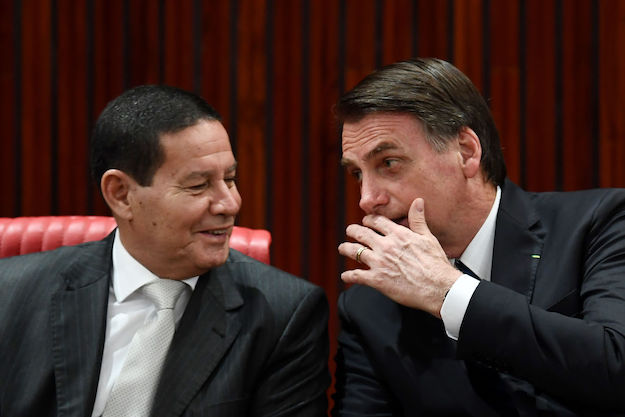RIO DE JANEIRO – The Amazon has a new sheriff in town. Brazilian President Jair Bolsonaro on Jan. 21 tapped his vice president, former army General Hamilton Mourão, to lead a newly formed Amazon Council. Mourão and the council will be tasked with coordinating the inter-agency response to rainforest issues on everything from agriculture and conservation to development and the deployment of the armed forces.
That could be good news. The vice president has been a dissonant voice within the administration when it comes to protecting the Amazon. Mourão has stated publicly that climate change is real, and that policies for the Amazon region have been lacking “coordination and leadership.” The hope in the environmental community is that this new role could offer stability and help the government regain the lost confidence of trade partners, NGOs and local governments.
Bolsonaro unveiled the appointment on Twitter just as global leaders, entrepreneurs and a who’s who of global finance were discussing the transition to a low-carbon economy at the World Economic Forum in Davos. While Brazil’s presence at the forum’s environmental discussions was almost non-existent, the creation of the council may be intended as a signal to the international community that the administration listened – and is ready to react – to global backlash to their policies in 2019.
Prior to the announcement, it was hard to see how the Bolsonaro administration could possibly fix its environmental record, given Cabinet members’ recent rhetoric and policy positions. Environment Minister Ricardo Salles hired an external consultant to argue against the government’s own satellite data when it showed an increase in deforestation in the Amazon. Agriculture Minister Tereza Cristina and Economy Minister Paulo Guedes have mixed intriguing proposals to develop the Amazon sustainably with less enlightened ideas such as expanding sugar cane plantations and extending soy crop limits. In this context, putting Mourão front and center offers the prospect of a light at the end of the tunnel, dim though it may be.
Indeed, if the vice president is able to navigate Amazon conservation effectively, it will mark a stark change of course for the administration. Throughout 2019, Bolsonaro’s government seemed focused first and foremost on taking operational power away from existing environmental institutions. The result was a deep hit to Brazil’s reputation as a global environmental leader. The water regulatory agency, ANA, was brought under the umbrella of a regional development ministry. Implementation of the forest code was handed over to the agriculture department. The department in charge of anti-deforestation policies has no secretary at all, while the institute charged with monitoring and policing environmentally sensitive areas, Ibama, has 29 management positions currently unoccupied.
With the Amazon Council, the Bolsonaro government has a chance to develop a real, even constructive policy toward the region.
Details are limited on how the council will work and how it will be organized. But Mourão has taken positive first steps, convening meetings shortly after his appointment and beginning a dialogue with regional political leaders and technical agencies tasked with monitoring the rainforest. Mourão knows the region well, and the armed forces were quietly instrumental in dealing with the twin environmental disasters – the Amazon fires and mysterious oil spills off the coast – that plagued Brazil last year.
Mourão’s appointment may well suggest recognition within the administration of the damage Bolsonaro’s lack of environmental stewardship could do to the country’s economic future. Other members of the government have started sounding the economic alarm – the head of the Central Bank, Roberto Campos Neto, and the economy ministry’s head of treasury, Mansueto Almeida, have both warned about the risk of lower financial flows to Brazil, suggesting that international investors are actively asking about the country’s environmental policies.
Challenges ahead
Whatever shape it ultimately takes, the Amazon Council will have a lot on its plate from the very start. Policymakers in the region have recently begun exploring ways to capitalize on the so-called bio-economy, using technology to monetize sustainability such as through the use of drones to monitor deforestation or manage fishing. The Free Trade Zone of Manaus, an industrial hub in the region, currently has 50 such initiatives in its portfolio, amounting to 700 million reais ($167 million) in projected annual revenue.
Not all proposals on the table are quite so positive. The administration’s current land reform proposal would simply formalize claims to land taken illegally, including settlements on public lands. A proposal to allow mining in territory officially demarcated for indigenous communities is another time bomb. The current leader of the lower house, Rodrigo Maia, has said he would not bring such a proposal to a vote, but the mining bill was one of the first presented by the Bolsonaro administration as Congress resumed work on Feb. 3.
Last year was a bad one for the Amazon and for Brazil’s environmental reputation. But all is not lost. Past experience shows that a strategic focus on protecting the rainforest can yield results. In 2003, when deforestation related to soy and cattle production reached record highs, the federal government created a central department – not unlike the new Amazon Council – to coordinate the inter-agency response. The result was a sharp drop in deforestation rates between 2004 and 2012.
Mourão, so far, appears well positioned to lead a similar process. If he can succeed in toning down the administration’s rhetoric on the environment and move to strategic and structured actions to combat illegal players in the region, Brazil may just be able to avoid another burning crisis like the one it endured in 2019.
—
Unterstell is the director of policy think tank Talanoa. Follow her on Twitter @unatalie








